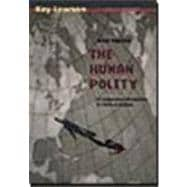
| Note: Each chapter includes a Summary and Conclusion | |
| Thinking About Politics | |
| Politics and the Human Polity The Meaning of the Human Polity The Scope of Political Science | |
| The Language of Politics Concepts That Name Structures Conceptualizing Relationships of Control Political Concepts Regarding the Quality of Life II. The Context of Politics | |
| Political Ideologies What Is an Ideology? Is Feminism a New Ideology? The Language of Ideology | |
| Political Economy Economic Factors That Commonly Influence Politics Political Determination of Economic Systems Global Issues of Political Economy Regime Change | |
| The "Iron Rice Bowl" Comes up Empty in China | |
| Politics and Culture The Political Culture of the Nation-State The Political Culture of Subnational and Supranational Groups Impact of Cultural Divisiveness on the Nation-State Regime Change | |
| Political Change and Culture | |
| The Case of Afghan Women III. Acting in Politics | |
| The Individual in Politics Public Opinion Regime Change | |
| An Individual Makes a Difference: Nelson Mandela Modes of Individual Participation Participation by Voting in Elections | |
| Organizing for Politics: Interest Groups Benefits to Joiners of Interest Groups How Organized Is the Interest Group? | |
| The Goals of Interest Groups The Tactics of Interest Groups How Well Do Interest Groups Do Their Work? | |
| A Special Problem of Interest Group Behavior | |
| Extraconstitutionalism Regime Change | |
| Organizing to Protect Human Rights in the New Latin America Business as an Extraconstitutional Force | |
| Political Parties Political Parties as a Unique Form of Political Organization The Functions of Political Parties Party Organization | |
| Is Internal Party Democracy Possible? | |
| The Members of Parties The Selection of Candidates Preparing the Campaign Executing the Campaign | |
| Parties and the Media Parties in Government Regime Change | |
| From Guerrilla Movements to Political Parties in Mozambique The Role of Parties Today IV | |
| The Work of Government | |
| Legislative, Executive, and Judicial Functions | |
| Making the Laws Lawmaking in the Legislature The Relationship Between Legislative and Executive Power Representation | |
| Legislators and Their Constituents Cameras, Committees, and Customs | |
| Other Variations in Legislatures Regime Change | |
| Russia's Duma Adopts Western Ways Lawmaking Outside the Legislature Regime Change | |
| Lawmaking by Judges | |
| The Case of | |
| Running the Government | |
| Executives and Bureaucrats Becoming a Leader What Chief Executives Do The Bureaucracy Regime Change | |
| The Role of Bureaucrats in the Transistion from Communist to Capitalist Economies Too Much Government? | |
| Or Too Little? | |
| Justice under the Law What Is Justice? Regime Change | |
| Can Justice Be Done after Regime Change? | |
| Choosing Credible Judges An Independent Judiciary | |
| Theory and Practice Guidelines for Adjudication | |
| The Kinds of Kinds of Law V. Alternative Arenas of Government | |
| Accessible Government | |
| Local and Provincial Politics The Nature of Subnational Government Unitary, Federal, and Confederal Political Systems Regime Change | |
| Can Federalism Bring Peace to Former Yugoslavia? Intermediate Levels of Government Local Government | |
| International Relations A Contemporary Issue of International Politics | |
| Human Rights The Actors in International Politics Organizing International Politics The Conduct of International Politics | |
| Law Versus Force | |
| Regime Change in Human Polity Establishing Democracy Kinds of Transitions Regime Change and the Individual Regime Change | |
| Women before and after Regime Change in Poland Regime Change and International Institutions | |
| Table of Contents provided by Publisher. All Rights Reserved. |
The New copy of this book will include any supplemental materials advertised. Please check the title of the book to determine if it should include any access cards, study guides, lab manuals, CDs, etc.
The Used, Rental and eBook copies of this book are not guaranteed to include any supplemental materials. Typically, only the book itself is included. This is true even if the title states it includes any access cards, study guides, lab manuals, CDs, etc.